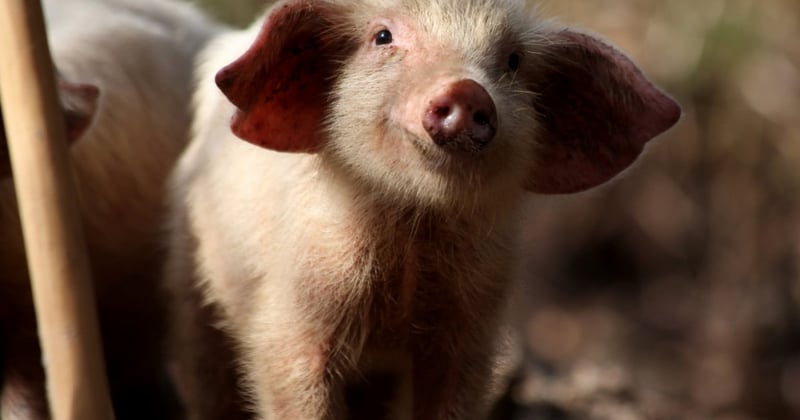
Protect Farmed Animals For National Farm Animals Day: 4 Ways to Reduce Factory Farming Cruelty
Blog
The majority of animals farmed for food live in conditions that cause extreme suffering and stress. That’s why it’s time to rethink farming.
World Animal Protection works tirelessly to protect animals around the world, but we also work to protect the animals that live in your communities, including farmed animals. However, we need your help to stop the cruelty and abuse on factory farms in the United States. That’s why on National Farm Animals Day, an annual awareness day promoting better farmed animal welfare, we’re sharing 4 ways that you can join us to make a difference for farmed animals.
1. Keep farmed animals safe from natural disasters
Most of the 9 billion chickens, pigs, and cows raised for food in the U.S. each year are confined to tight and crowded spaces, which means they’re unable to live natural and healthy lives. This also means that when natural disasters strike, like hurricanes, floods, tornadoes, or wildfires, millions of farmed animals are killed or injured because they're physically constrained, whether by cages or lameness caused by their poor conditions. Intensive farms are highly concentrated in areas at high-risk for disasters, and the large number of animals on a single farm makes it impossible for industrial farmers to evacuate them.
What you can do: Support our disaster response fund, which serves our partners on the ground who are providing aid, rescue, and resources to animals who have been impacted by disasters.
2. Pledge to raise pigs right
Mother pigs on factory farms are often confined in cages no bigger than a refrigerator—these pigs endure mental suffering, are at higher risk of illness, muscle weakness, or injury, and are unable to even turn around. Pigs in the pork production system also live in barren pens with concrete flooring, leading to skin lesions and disease. Piglets have their tails and teeth cut to keep them from harming one another in the too-tight quarters usually without anesthesia.
What you can do: Use our simple form to urge your legislatures to support the Farm System Reform Act, which would decrease the number of farmed animals kept in extreme confinement and subjected to brutal mutilations, as well as reduce the overuse of antibiotics in agriculture.
3. Create change for chickens
Due to their overgrown size and quick rate of growth, many chickens on factory farms suffer skin wounds, painful lameness, and overworked heart and lungs before being slaughtered for food. These chickens have no opportunity to behave as they would naturally and know only cruelty during their short lives.
What you can do: use our quick-fill tool to urge your legislators to include the PLANT Act in the Farm Bill to ensure that farmers and companies producing plant-based foods are eligible for USDA programs.
4. Eat less meat
Eating less meat and purchasing from only high-welfare farms is crucial in shifting away from cruel factory farming. A nationwide reduction in meat consumption has the potential to put an end to some of the cruelest practices, such as extreme confinement, the overuse of antibiotics, and brutal mutilations. By reducing the overall demand for meat, World Animal Protection expects that family farming and practices that are more sustainable and kinder to animals will replace low welfare practices.
What you can do: Reduce factory farming cruelty and your impact on the environment by joining our community Plant-Powered Changemakers, which provides resources for reducing the amount of cruelly-produced meat you eat and trying more plant-based alternatives.
National Farm Animals Day isn’t the only day that you can help protect the lives of farmed animals and do your part to stop factory farming cruelty. Learn more about the other ways that you can take action with World Animal Protection and support our efforts to protect animals in farming.